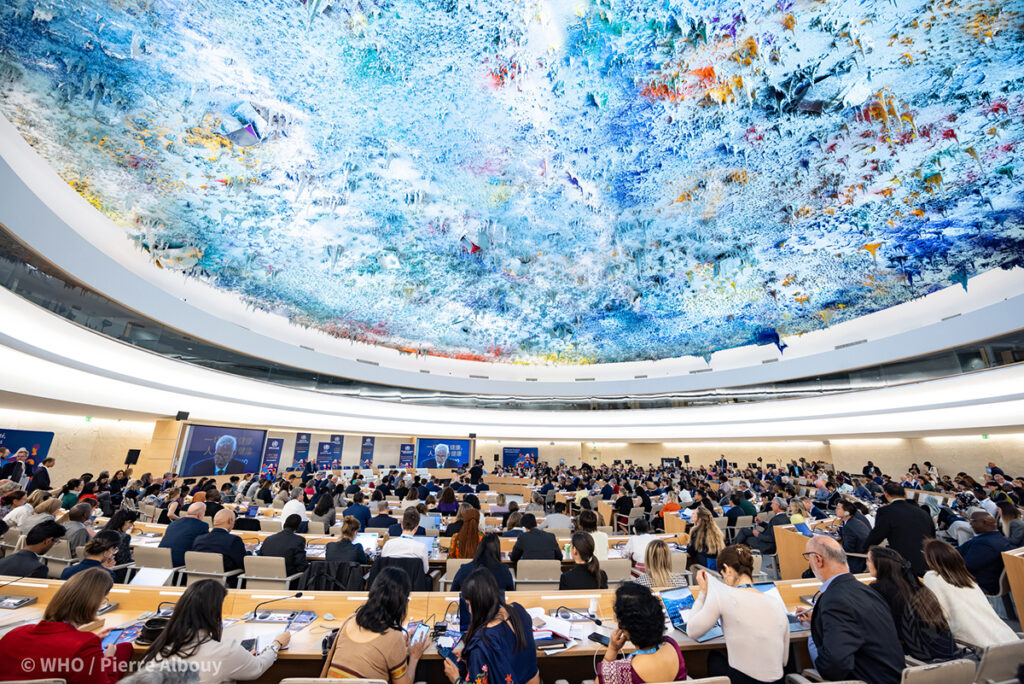
© WHO / Pierre Albouy
Geneva, 27 May 2025:- The Global Climate and Health Alliance (GCHA) today welcomed the adoption by the World Health Organization’s 78th World Health Assembly (WHA78) of the Global Action Plan (GAP), which will take forward last year’s Resolution on Climate Change and Health, while criticising the removal of mention of fossil fuel subsidies from the text.
“We welcome the adoption of the Global Action Plan as a crucial tool for protecting human life from the impacts of climate change”, said Rosie Tasker, Clean Air Liaison at the Global Climate and Health Alliance, which is made up of more than 200 organisations addressing climate change. “This important milestone was only made possible by significant efforts by the co-facilitators and regional leaders from governments, supported by the health community”.
“However, the absence of any mention of the impacts of fossil fuels or the need for fossil fuel subsidy reform misses a key opportunity to emphasise these connections in the minds and policies of governments around the world”, added Tasker. “Crucially, its adoption marks the start of a new phase where governments and WHO are committing to accelerated action on climate and health.“
Key strengths of the Global Action Plan include a call for member states to integrate health into Nationally Determined Contributions (NDCs – countries’ national climate commitments under the Paris Agreement) and integrate climate into national health strategies, policies and plans; a strong focus on maximising the health co-benefits of mitigation and adaptation activities across different government sectors; and a commitment to engage communities and civil society organisations in the development, implementation and evaluation of climate and health strategies.
However, the plan’s path to adoption was made difficult by a number of member states calling for postponement, including Saudi Arabia, Egypt, Russia, Bahrain, Venezuela, supported by other countries from the WHO’s Eastern Mediterranean region that have been calling for the plan’s postponement. But, over the course of discussions on Monday afternoon, these voices were far outweighed by more than 60 countries who took to the floor to share why it was critical to adopt the global action plan.
A small number of high-income countries, including the UK, Germany, Australia and Japan, supported the action plan as a whole, but officially noted their objections to language on Common But Differentiated Responsibilities and Respective Capacities (CBDR-RC), a concept included in the Paris Agreement, which calls for global solidarity in climate change responses.
“Without action to mitigate climate change through reduction of fossil fuel use, the health impacts of climate change will soon outstrip the capacities of health systems to respond”, said Tasker. “To counter this, governments must make climate a core part of national health strategies, and health a key part of countries’ Nationally Determined Contributions (NDCs); governments must include a stronger focus on vulnerable groups such as women and children, older adults, LGBTQ, refugee and migrant populations, and people with poor mental health or disabilities.”
“The adoption of the Global Plan of Action means that governments must now recognise and respond to the profound role that climate change and its primary driver, fossil fuels, play in determining health outcomes for people around the world”, concluded Tasker.
ENDS
Contact
Dave Walsh, Communications Advisor, Global Climate and Health Alliance, [email protected], +34 691 826 764 (Available from 0630 CET)
About GCHA
The Global Climate and Health Alliance is a consortium of more than 200 health professional and health civil society organisations and networks from around the world addressing climate change. We are united by a shared vision of an equitable, sustainable future, in which the health impacts of climate change are minimised, and the health co-benefits of climate change mitigation are maximised.
Find out more: https://climateandhealthalliance.org/about/

